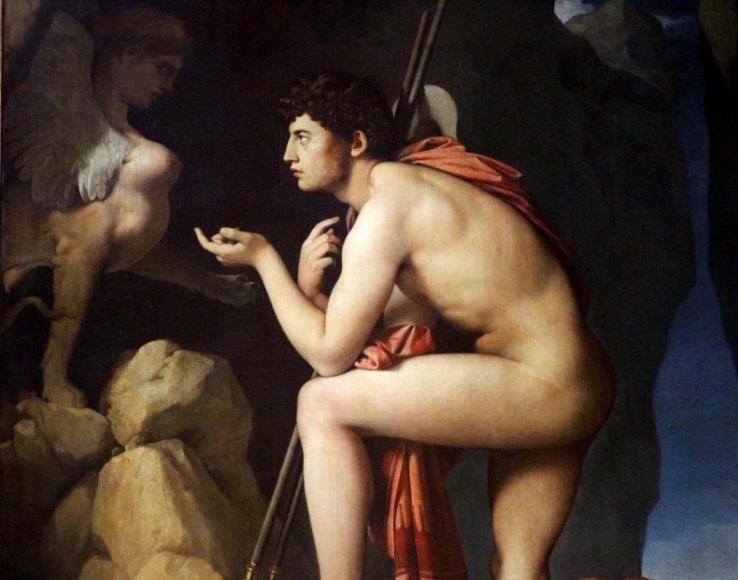The Oedipus myth's Paintings
The tales of Oedipus' misfortune is directly related to his screwed-up father, the Theban monarch Laius, who managed to enrage the gods. Lai once admired a lovely young man who had a blue vein on his forehead when he was younger. Chrysippus was the young man's name, and he was the son of King Pelops, who unwisely housed the future Pope Oedipus. Lai abducted the son of King Chrysippus in return for hospitality, carried him to Thebes, and treacherously raped him. therefore disgracefully treating a young man who is wholly straight (which is already unusual for Greece). It is evident that Pelops could not tolerate Lai's betrayal and cursed him to hell by invoking the wrath of the Greek gods. Later, Lai was crowned king of Thebes and wed the lovely Jocasta, but that was terrible luck. He was unable to leave any heirs. And Chrysippus, who was messed up in his childhood, is at fault.
Years went by. Lai governed Thebes in silence, although he was childless. He once travelled to Delphi to see the oracle on the causes of his infertility and received the advice: "Do not wish yourself a son against the will of the gods. When he is born, you will perish at his hands, his mother will become his wife, and your entire family will be drenched in blood.
When Lai's baby was born, he strapped his legs together, called a slave, and told him to dump the infant into the forest so that wild animals would rip him to pieces. Lai came home with sad heart. The slave seized the infant and brought it into the wilderness, but when his master had ordered him to do otherwise, the slave felt bad for the youngster and decided to take the child to the nearby city of Corinth instead. There, where herds were grazing on the slopes of the mountains, he entrusted the kid to one of the slaves of the Corinthian king Pelops. King Pelops was an empty-nester. After learning of the boy, he made the decision to take him home and nurture him as an heir. He carried out his plan, snatched the boy from the shepherd, and gave him the name Oedipus, which is Greek for "The Man with Swollen Feet," since the boy's legs were tightly bound with a belt and had a large amount of swelling.
Oedipus grew raised in Pelops' palace, thinking of him as his father and having no idea where he came from. The palace once hosted a festive feast when plenty of wine was consumed and the attendees were utterly inebriated. Additionally, Oedipus overheard insulting words: "Foundling! You are not the son of our monarch!" during a drunken argument. Oedipus was grieved by the insult; he inquired of Pelops whether the visitors were saying the truth, but the latter counselled against listening to idle gossip. Oedipus remained agitated. He sought guidance from the oracle. Through the Pythia, Apollo said, "Terrible is your fate, Oedipus! You'll murder your father, wed your mother, and have offspring from your union that the gods have cursed!
After hearing such a dire prophecy, Oedipus made the decision to leave Corinth for good. Without realising it, he followed the first route that he came upon, which goes to Thebes. He guided him into a little gorge. Here, the route was congested, making it hard to disperse. Oedipus almost ran into the chariot a gray-haired, regal-looking elderly guy was riding as he was lost in meditation. The gruff voice of the driver, "Get out of the way, tramp!" could be heard. Don't you see that the route can only support a chariot?
Oedipus had a tendency to lose his anger. The driver's rudeness infuriated him, and he struck him with his staff until he was so badly injured that he collapsed to the ground and died. The chariot's owner and attendant servants charged the young guy, but Oedipus murdered them all with his staff. One slave was the only one to succeed in escaping. Oedipus then continued on his journey. He was unaware that the first portion of the prophesy had been fulfilled: Lai, his father, was the elderly man he killed.
Oedipus finally arrived at Thebes. He arrived to the city in profound despair. The gods not only delivered another attack—a monstrous Sphinx materialised close to the city—but also the king died. It had a female-like head, a lion's body, paws with razor-sharp claws, and enormous wings. The Sphinx gave all tourists a riddle to solve, and if they failed, it flung them from a cliff. No one who attempted to solve the puzzle lived, despite the efforts of many daredevils. Oedipus made the decision to gamble as well. He reasoned, "It is better to die than to live in a faraway country as a rootless exile.
He arrived to the rock home to the Sphinx. "Create a puzzle! I'm all set! "To the beast, he said. If you're so courageous, describe to me what sort of animal has stronger legs as it gets older and walks on four legs in the morning, two in the afternoon, and three at night. Your question is rather easy, Oedipus said with a chuckle. A guy is this. He gently crawls on all fours in the dawn of his life when he is still young and frail; he walks on two legs throughout the day, or in maturity; and in old age, or in the evening of his life, when he is arthritic and in need of assistance, he uses a crutch, which acts as his third leg.
When the Sphinx learned the solution to her riddle, she became desperate and pushed herself down the cliff, breaking her neck in the process. When Oedipus returned to Thebes, the populace crowned him king in honour of his inventiveness. Oedipus began to reign Thebes after taking Queen Jocasta, the deceased Laius's wife, as his wife. Two girls, Antigone and Ismene, and two sons, Eteocles and Polyneices, were among his soon-to-be born offspring. As a result, the second half of the prophecy came true since Oedipus did marry his own mother.
Oedipus was a wise ruler, and the people of Theba loved him. But because of a curse he carried, the gods cursed the city and brought a dreadful illness there. Unburied bodies were left on the city's streets because the Thebans did not have time to bury the deceased. Screams and moans could be heard everywhere.
After the outbreak, Thebes experienced hunger; no crop fields were provided, and a dreadful plague ravaged the cattle. The sacrifices the residents offered to the gods were in vain since they did not respond to their petitions, and the problems only became worse.
The gods will have pity if the people throw away the one who brought this misfortune upon them by his wickedness; make him pay for the spilt blood of Lai. Oedipus then dispatched Creon, the brother of his wife, to Delphi to consult the oracle. Creon returned with this response. How then can you catch the murderer?
So Oedipus called Tiresias, a blind sorcerer, to his home. He had a remarkable talent from the goddess Athena: he could see the past and the future. Tiresias resisted Oedipus' query for a while before ultimately responding, saying: "You yourself, Oedipus, are the criminal you are seeking for! You killed your father without knowing him, and without knowing your mother, you wed her. Oedipus was furiously enraged at Tiresias, labelled him a liar, and threatened to kill him because he thought he had been bought off by enemies.
The soothsayer was chased away by Oedipus, but a dark foreboding crept into his spirit. He was gradually made aware of the horrible reality. The will of fate has been carried out! Oedipus hurried to his palace out of despair, but there he found a fresh sorrow: Jocasta had killed herself because she could not face the horror of what had transpired. Oedipus ceased to desire the sun's brightness, his native Thebes, or offspring. He also ceased to desire life. Inflicting himself with blindness, Oedipus departed Thebes. Only his daughter Antigone was present when he passed away.
.JPG) |
| "Oedipus and the Sphinx", 1864 - By Gustave Moreau (1826 - 1898) |
.JPG) |
| "Oedipus and the Sphinx", 1903 - By François Emile Ehrmann (1833–1910) |
 |
| "Oedipus and the Sphinx", 1808 - By Jean Auguste Dominique Ingres (1780 - 1867) |


.JPG)
.JPG)
.JPG)
.JPG)
.JPG)
.JPG)
.JPG)
.JPG)
.JPG)
.JPG)
.JPG)
.JPG)



Keine Kommentare:
Kommentar veröffentlichen